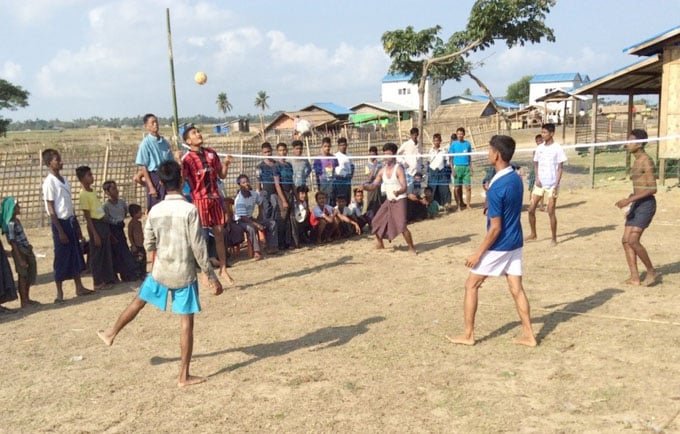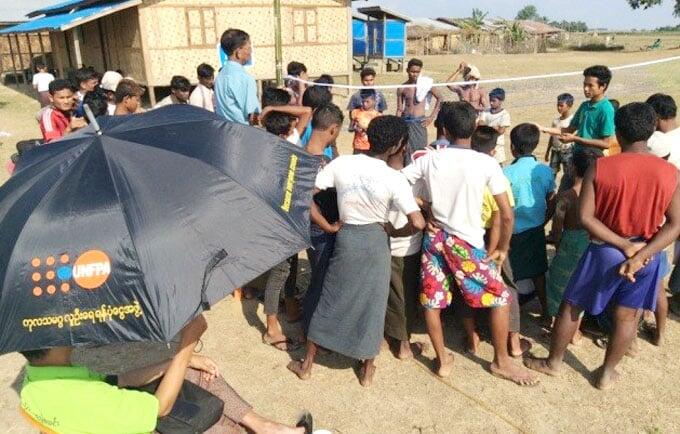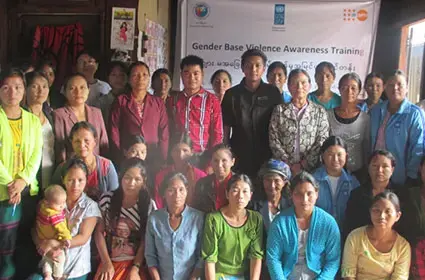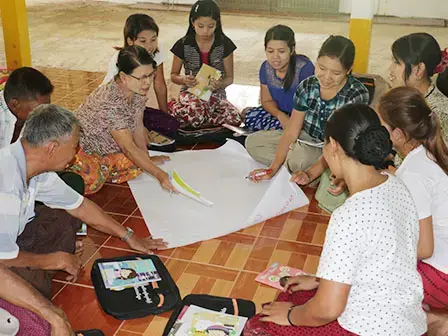UNFPA, and its partner the Myanmar Medical Association (MMA), has brought together Muslim and Rakhine communities through the traditional game of Chin Lone in an initiative to disseminate information about reproductive health (RH), and to foster peace building among internally displaced persons (IDPs) from both Muslim and Rakhine communities. Starting in May 2016, RH education sessions have been held together with Chin Lone games in Thet Kal Pyin camp in Sittwe.
The initiative of using Chin Lone as a vehicle to bring IDPs together, and use sport as an entry point to disseminate information on RH as well as a medium for peace building, was proposed during a mini conflict sensitivity assessment conducted by UNFPA with MMA in March 2016.
Chin Lone is a traditional sport, very popular among young people across the country. As it has no teams, it is a non-competitive game. The focus is not on winning or losing, but how beautifully the game is played. A team of players pass the ball back and forth with their feet, knees and heads. The players support each other to keep the ball in motion so it is very much a team building exercise.
The first time this activity was held, around 500 IDPs came to watch the game, while more than 150 young people participated. Before the game began, a doctor from MMA spoke with participants about the prevention of HIV and sexually transmitted infections (STIs), all of whom were interested in the topic and keen to ask questions.
MMA, with the support of UNFPA, provides basic reproductive health services to Muslim and Rakhine IDP communities around Sittwe through mobile outreach teams. Services include antenatal, postnatal, and newborn care, family planning, health education and referral services, including for high risk pregnancies.
MMA also focuses on ensuring that men and young people have access to accurate information on reproductive health issues through awareness raising activities. Topics covered range from HIV/AIDS, family planning, the danger signs of pregnancy to gender-based violence.
By integrating reproductive health education and peace building efforts, UNFPA is promoting the important role young people can play in fostering peaceful communities, while ensuring they have information on RH and know where they can access RH health care.
One young man from Thet Kal Pyin camp said: “I am very happy! I learned while playing a game. I gained knowledge about HIV, sexually transmitted infections and contraceptives as well as how to respect others. Respecting others will make life more peaceful”.
The camp committee, health authorities and police are pleased with the outcome of this initiative and have decided to hold monthly competitions. The camp leader said: “In the future, we plan to hold this activity here with us [IDPs] and our brothers in the surrounding villages”. The initiative will also be held in two other IDPs camps, with plans to expand to other areas, following a review by UNFPA and MMA.






